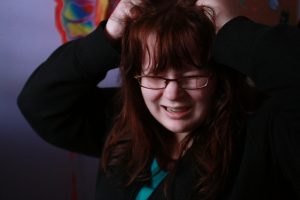OCD And Eating Disorders: Where Food And Anxiety Issues Can Overlap
 There is a fuzzy line between an eating disorder, and an obsessive-compulsive disorder (OCD) related to food. People with either disorder obsess about food, but for different reasons.
There is a fuzzy line between an eating disorder, and an obsessive-compulsive disorder (OCD) related to food. People with either disorder obsess about food, but for different reasons.
The distinction is that the anxiety accompanying an eating disorder concerns body-image and weight, and the anxiety triggered by an obsessive OCD thought, even one involving food, is not about body size.
Sometimes OCD and an eating disorder occur together—the OCD might even trigger the onset of bulimia or anorexia. Then, an individual may obsess that just by looking at fattening foods he or she will put on weight. This person might constantly weigh their self, eat only fat-free foods, purge, or over-exercise in response to the anxiety.
If someone has OCD unrelated to an eating disorder he or she may still obsess about food, but not about gaining weight. For instance, a person with OCD may repeatedly think that if they eat green colored foods something bad will happen to them, or someone they care about. Green salads, green beans, peas, and avocados will be avoided, but it has to do with safety and not body-size.
Other ways that people with OCD may try to neutralize food anxiety are eating at specific times, or in designated places, picking up and setting down glasses or utensils a certain way, chewing each mouthful of food a specified number of times, or eating foods in a certain order.
Although the mental focus in OCD and eating disorders is distinguishable, some resulting behaviors are the same or similar. Both disorders can involve food hoarding, food avoidance, extreme selectivity about what can be eaten, isolating behavior, and a distorted relationship between food and a sense of well-being.
Both disorders can also lead to serious physical health problems such as fatigue, lack of concentration, and malnutrition issues.
As are eating disorders, eating related OCD is a progressive and chronic issue best addressed sooner than later. All OCD, whatever the focus of the obsessions, is typically treated with cognitive-behavioral therapy (CBT) and exposure-response prevention (ERP) therapy. Neither solution is quick, but for many individuals prove effective.
Source: Neuro Behvioral Institute
Photo credit: anna gutermuth / flickr
 Eating Disorder Self Test. Take the EAT-26 self test to see if you might have eating disorder symptoms that might require professional evaluation. All answers are confidential.
Eating Disorder Self Test. Take the EAT-26 self test to see if you might have eating disorder symptoms that might require professional evaluation. All answers are confidential.